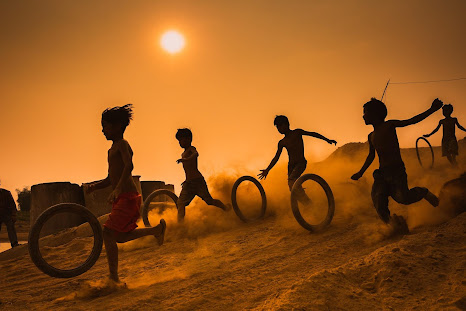Meaning, Concept and Stages of Socialization.
1. Meaning of Socialization
Socialization is a process in which a person interacts with others and shape as well as mold his/her personality according to the prescribed norms of a society.
1.1 Definitions of Socialization
Followings
are some important definitions of socialization by well-known sociologists.
D Macionis
“The life long process by which as individual becomes the proper member of
society and develops human characteristics.”
Horton
and Hunt “It is a learning process in which groups interact and learn
social norms also develop his/her self.”
Definition
of Socialization according to Ogburn: “It is the process of learning the
norms of the group and society “
MacIver:
“It is the process through which social beings develops relationships and
association with each other.”
Bogardus:
“A process of learning to live and work together is called socialization.”
Vijay
Anand “Socialization
is the process of internalization of social norms, Values and behaviour and act
according to them to establishing a relationship with others members of
society.”
1.2 Characteristics of Socialization:
1. It
is a gradual and life-long process.
2. It
helps in the inculcation of principles, values and symbols of a social system.
3. It
enables a person to enact certain roles.
4. The
roles that one enacts are in accordance with what he has learnt form the
process.
5. The
roles a person enacts are the expressions of his social nature.
6. The
development of the social nature enables the person to participate in social
life.
7. The
nature of what one communicates in society is determined by the influence of
one's interaction with the society.
8.
Most human behaviour is learned, not
instinctive. The capacity of the child to learn and to internalize is called
the plasticity of human nature.
2. . Stages of Socialization
The Process of socialisation is gradual. A child
concentrates one task or few tasks at a time.
Social scientists have marked four stages of socialization.
1.
The Oral Stage
2.
The Anal Stage
3.
The Oedipal Stage
4.
Adolescence
1.
The Oral Stage: (infancy to 1 year)
At the first stage the infant builds up fairly definite expectations
about feeding time,
and he learns to signal his pressing needs for care.
Ø Child needs to be fed as it is
helpless and dependent on other for survival.
Ø It also needs to be protected from external
environment.
Ø During this stage child cries (as a
signal) as a way to communicate its need.
During this stage, the infant is not involved in the family as a whole.
He is involved only in the subsystem consisting of himself and his mother.
2.
The Anal stage: (1 -3 Years)
The anal stage of socialization covers the period between first and
third year of child's
life. Toilet training is the main focus of this stage. During this stage
the child internalizes
two roles- his/her own and that of his/her mother, now clearly separate.
The child receives love and care and give love in return.
3.
The Oedipal Stage (3 Year to Puberty)
The third stage extends from about the fourth year to puberty.
During this stage
Ø The child becomes a member of the
family as a whole. The child identifies itself with the social role ascribed to
him/her on the basis of his/her sex.
Ø According to Freud, the boy develops
Oedipus complex and girl develops Electra complex.
Ø At this stage. Children go through
identity conflict.
Ø Boys generally identify with the
father and girls with the mother.
4.
Adolescence: (Puberty to Adulthood)
The fourth stage begins roughly at puberty. At this stage young boy or
girl wants to be
freed from the control of parents. The 'crisis' of this period is
precisely the strain produced by much greater demands for independence. By the
time the individual attains maturity major part of socialization is over,
though it continues for whole of the life.


.png)
Comments
Post a Comment